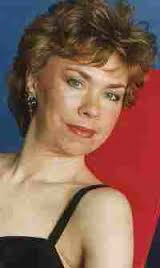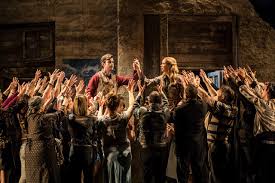|
Today, 28 February 2017, English National Opera (ENO) is pleased to announce that Sally Burgess is joining the ENO Board of Trustees with immediate effect. Highly acclaimed mezzo soprano Sally Burgess began her long and renowned relationship with ENO in 1978 as Zerlina (Don Giovanni). She has since returned to perform over 40 roles with the company, the most notable being Carmen, Octavian (Rosenkavalier) and Judith (Bluebeard’s Castle). Her distinguished career includes performances at most of the world’s major opera houses, including The Metropolitan Opera, New York; Bayerisches Staatsoper, Munich; Opera National de Bastille, Paris; The Royal Opera House, Covent Garden; and Houston Grand Opera. On the concert platform she has collaborated with many eminent conductors including Sir Mark Elder, Sir Charles Mackerras and Daniel Barenboim. Sally is Vocal Professor at the Royal College of Music and Professor at the Guildhall School of Music and Drama. She is an internationally sought after teacher of voice and stagecraft and leads masterclasses, workshops, competitions and regularly directs opera scenes across Europe, Russia and South Africa. In 2011 she was made a Fellow of the Royal College of Music (FRCM). Commenting on the appointment, ENO Chair, Dr Harry Brunjes says, ‘I am delighted that Sally Burgess has kindly accepted our invitation to join the board. As a company we will all benefit enormously from Sally’s expertise and experience. It will be a privilege to work alongside a singer and a performer with such a deserved reputation in the opera world.’ ENO Artistic Director Daniel Kramer commented, ‘I am thrilled to welcome Sally back to ENO, and certain that she will be a huge asset to our Board. She brings with her a deep understanding of the company, its history and its values to support the artistic team with long-term strategy and planning.’ ENO’s Chief Executive, Cressida Pollock said, ‘We are all looking forward to working with Sally, and to the numerous ways in which her significant creative expertise and experience, alongside her passion for the company, will strengthen ENO’s Board.’ Sally Burgess commented: ‘I am delighted to join the Board of English National Opera, and I look forward to contributing insights gained from my experience as both a performer and a vocal specialist. ENO is a company I have performed over 40 roles with, and so I know first-hand how wonderful it is to work alongside their award winning Orchestra and Chorus as well as their exceptional production and technical teams.’ |
Daily Archives: 28 February, 2017
ENO: The Winter’s Tale
London Coliseum, Monday 27 February 2017
When the RSC stages The Winter’s Tale it normally runs over three hours. Ryan Wigglesworth’s new opera based on the play runs for under two hours, so we are immediately aware that this is going to be a highly focused, not to say intense, adaptation of the play – and so it proves to be. Gone are the comic characters, all of the songs and incidental music, dancing is reduced to a brief aside. The focus is entirely on the impact of jealousy in both Leontes and Polixenes.
Vicki Mortimer’s high walled setting constantly encloses and cuts off the characters from each other, and placing both Sicilia and Bohemia under military rule gives little sense of contrast in the second act. If anything, the music underlines the unifying factors rather than the differences between the two countries.
The conclusion moves away from Shakespeare. Though Hermione returns to life there is little sense of resurrection or restoration here, and the final image is uncomfortably spectral, as the dead Mamillius wanders slowly off stage.
Ryan Wigglesworth’s score mirrors this intensity of approach with music that is frequently edgy and uncomfortable. There are few lyrical moments, even in Bohemia, and characters rarely reflect on their positions, though Iain Paterson’s finely drawn Leontes is allowed two more-extended introspective moments.
Sophie Bevan makes what she can of Hermione though the trial scene gives her nowhere near enough emotional scope for us to empathise more than at the most superficial level. Samantha Price makes more impact as Perdita though sixteen years living rurally is glossed over.
The concentration of the text makes Polixenes a more important protagonist, strongly sung by Leigh Melrose. His – spoken – assault on Florizel becomes one of the strongest moments of the evening, drawing parallels with the first act in an almost identical setting.
Smaller parts are well rounded but the most interesting musical innovation comes with the chorus. There is, of course, no chorus in Shakespeare. Verdi had to interpolate choruses into his settings and Wigglesworth does the same. They are very effective, particularly the protest for Hermione, which has no place in the original but here reflects current political unease very succinctly.
Rory Kinnear’s production is masterly in its understatement and naturalism. Even in moments of high tension he manages to maintain a convincing sense of normality taken to the edge. He brings all his experience of working in the theatre to ensure that even the most unlikely events convince and that emotions are always credible. It is a remarkable debut and he will surely be asked again – and soon!
SUSSEX ALIVE
Saturday 4 March 2017 7.45 p.m.
St Michael’s Church, Lewes High Street
Directed by Andrew Sherwood
Bach Goes to Sussex
Bach – Brandenburg Concerto No.3
Peter Copley – Tango
Robin Milford – Concertino for piano and strings in E Major, Op.106
Fishing by Moonlight for piano and strings
Soloist Margaret Fingerhut
Bartók – Divertimento for String Orchestra
7.10 p.m. Pre-concert talk
Peter Copley discusses tonight’s music
GARSINGTON OPERA AND COASTAL CULTURE NETWORK
As a result of Magna Vitae and Garsington Opera for All’s pioneering education and outreach work integrated with free public screenings of opera in isolated coastal and rural communities, a new online network – the Coastal Culture Network (CCN) – has been formed. CCN aims to strengthen the network of cultural provision around the coast by bringing together coastal local authorities, cultural organisations, Coastal Community Teams and others with an interest in the role of culture in seaside locations.
Culture and the coast are inextricably linked. Always part of the English seaside attractions, in recent years contemporary arts and culture have helped to reinvigorate many coastal towns following the decline of traditional tourism. The potential of culture to be a key factor for regeneration is now widely acknowledged and the CCN aims to build on this and drive it forward. Projects such as Opera for All feed into the process by raising confidence and aspiration and impacting on community cohesion.
Opera for All was set up by Garsington Opera, Magna Vitae and the Coastal Communities Alliance in 2015 after a successful bid made to Arts Council England for funding, which enables a large-scale programme of education and outreach work in isolated and rural coastal communities together with free digital screenings of a performance from Garsington Opera to be run. For a period of three years, this has provided ground-breaking opportunities for communities to be involved in creating, learning about and performing opera.
Projects and free screenings will again take place this year in Skegness, Ramsgate, Highbury/Burnham–on-Sea and Grimsby and over 1000 young people will take part in creative residencies at both primary and secondary schools. For the students in each of the 25 schools, the experience of working alongside a team of professional artists to create and perform their own pieces in relation to the opera that will be screened (Semele 2017, Eugene Onegin 2016, Così fan tutte 2015) is transformative. For many, it is their first experience of live professional singing and it sets confidence and aspirations soaring. The programme challenges expectation by uncovering the ingredients and foundation of opera – drama, music, story-telling and expressive emotion.
The CCN can be found within the Coastal Communities Alliance website. Members will be able to join an online forum, communicate with other members to build partnerships, and access case studies, information and resources. These functions will go live March 2017.


